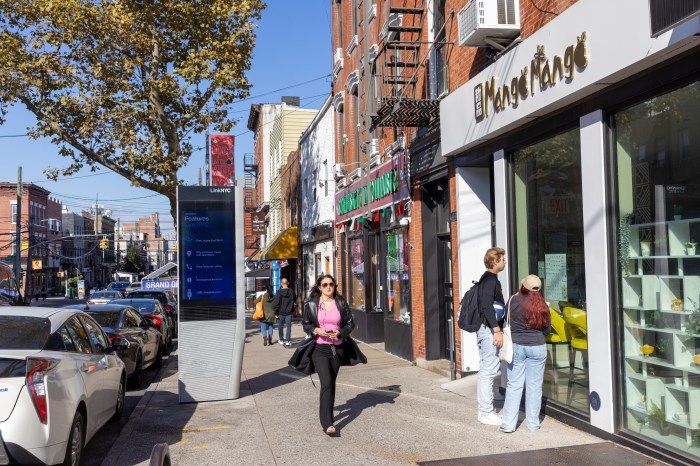
Photo provided by LICP
May 10, 2024 By Laura Rothrock
New York City has undergone significant changes since the 1960s, a transformation vividly evident in Long Island City (LIC). The neighborhood’s industrial areas are now complemented by a soaring skyline, and our historic landmarked streets and local commercial corridors now lead to an iconic waterfront.
This growth and change are reflected in our neighborhood’s diverse array of local businesses, which span a wide range of sectors, including retail, commercial, manufacturing, film, life sciences, and technology.
However, the rules governing New York City’s economy have not kept up with the times. Commercial zoning rules written back in 1961 remain largely untouched, and become more and more anachronistic with each passing year, which in turn has serious impacts on businesses here in Long Island City and across the boroughs. That’s why City of Yes for Economic Opportunity, a proposal to update our zoning for the 21st century, is so timely.
To give a sense of why the City of Yes for Economic Opportunity is so important, it’s worth providing examples of the outdated and downright bizarre zoning rules that are putting our businesses in a bind. On a retail street like Vernon Boulevard, you can bake bread, but you cannot make salsa. Zoning explicitly governs where telegraph offices can go but is silent about cell phone repair stores.
Some local small businesses, like coffee roasters, are subject to the same zoning rules that govern large, polluting factories. And believe it or not, many storefronts that predate 1961 are not allowed to be reoccupied if they go vacant for more than two years. The cumulative impact of rules like this cannot be overstated and is a driving factor of the elevated retail vacancy rates we see here in Western Queens and along other commercial corridors around the city.
City of Yes for Economic Opportunity, a Department of City Planning proposal that is currently under consideration by the City Council, would replace these convoluted regulations with clear rules that reflect the world we live in today. Local businesses would be provided with the flexibility they need to grow and fill empty storefronts.
These changes would be particularly welcome in our Business Improvement District, which reflects the importance of thriving commercial streets where the community gathers and cultures converge to enrich our neighborhood.
That’s not all though: City of Yes for Economic Opportunity would also boost New York City’s industrial service base, a critical part of our economy here in Long Island City. For example, today, many older buildings are restrained by unnecessary loading dock requirements, limiting the types of industrial tenants they can have. This plan would eliminate those requirements, greatly expanding the options available to fill their space.
The City of Yes would also introduce new zoning tools that will make it easier to develop modern, job-intensive loft buildings that can be formatted for many types of industrial businesses. That means more shops can get set up and get to work without mountains of red tape. With these commonsense reforms, our industrial businesses can adapt to a changing economy and continue to be important job-creating hubs no matter where our workforce goes from here.
The New York City economy is ever-changing and it’s no different in Long Island City. If we want our diverse array of small and local businesses to continue to evolve and thrive into the future, we need to ensure our zoning regulations give them the flexibility to do that instead of presenting roadblocks. We urge the City Council to say yes to “City of Yes for Economic Opportunity” and help create a more prosperous trajectory for our community and the city at large.

- * Laura Rothrock is the president of Long Island City Partnership (LICP) and executive director of the Long Island City Business Improvement District (LIC BID), which is managed by LICP. From 2013–2022, Laura was an executive at Nicholas & Lence Communications, a government affairs and communications firm. She started her career at the New York City Department of Small Business Services, serving as the BID Program’s executive director, where she represented nearly 70 BIDs across the city and oversaw its $100 million contract management portfolio. Laura holds a B.A. in Political Science from Loyola University in Maryland and a Master of City Planning from the Massachusetts Institute of Technology.
3 Comments







If you want to fix the commercial business issue, fine. Just, for the love of all that is holy, stop with the “luxury apartment mega-tower” overbuilding and overcrowding issue. Residential real estate developers should sit this one out.
If only the powers-that-be in LIC cared about what the residents (who aren’t local business owners or real estate developers) had to say about the neighborhood they live in.
“On a retail street like Vernon Boulevard, you can bake bread, but you cannot make salsa” So your saying on a street with no less than 2 illegal weed shops, making salsa is illegal? Salsa?
Long Island City is very different from other parts of the city. It is primarily for people without children and elders. What makes sense for Long Island City may not make sense for other parts of the city, especially parts where people flock to have more fresh air for children, or space to care for elders, at the cost of much longer commutes despite proximity to transit.